-
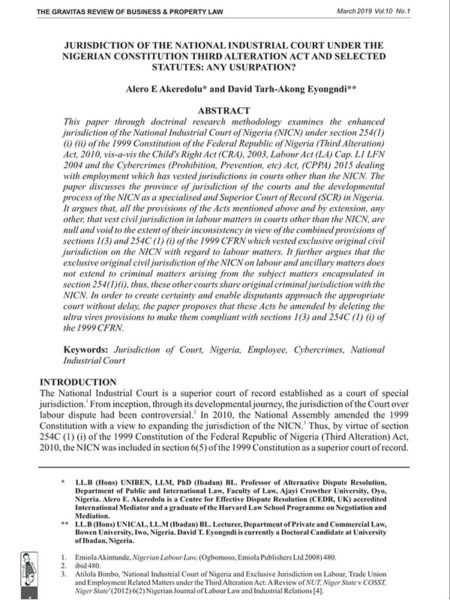
Jurisdiction of the National Industrial Court under the Nigerian Constitution Third Alteraction Act and Selected Statutes: Any Usurpation?
0₦2,500.00Professor Alero Akeredolu of Ajayi Crowther University, Oyo Nigeria and David Eyongndi of Bowen University, Iwo Nigeria in their article, Jurisdiction of the National Industrial Court under the Nigerian Constitution Third Alteration Act and Selected Statutes: Any Usurpation?, comprehensively examine the jurisdiction of the National Industrial Court. They consider whether the jurisdiction bestowed on other courts by the Labour Act, Child’s Right Act and the Cybercrimes (Prohibition, Prevention, etc.) Act in respect of employment matters contradicts the exclusive jurisdiction of the NIC under the 1999 Constitution of the Federal Republic of Nigeria (Third Alteration) Act, 2010.
-
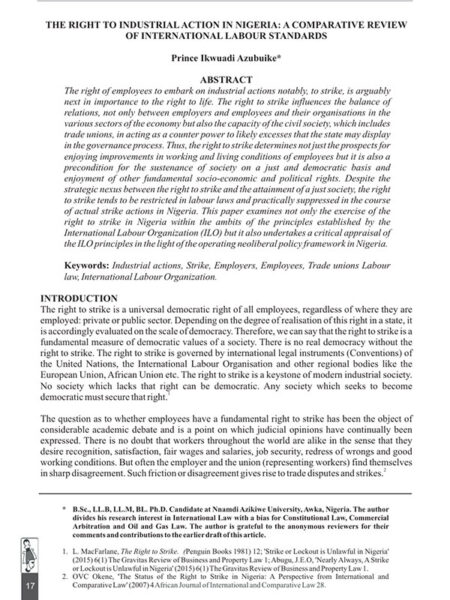
The Right to Industrial Action in Nigeria: A Comparative Review of International Labour Standards
0₦2,500.00Prince Azubuike, legal practitioner and researcher in his article, The Right to Industrial Action in Nigeria: A Comparative Review of International Labour Standards, notes that the right of employees to strike determines not just their prospects for enjoying improvements in working and living conditions, but it is also a precondition for the sustenance of a just and democratic. Despite the strategic nexus between the right to strike and the attainment of a just society, the right to strike tends to be restricted in labour laws and practically suppressed in the course of actual strike actions in Nigeria. He examines the exercise of the right to strike in Nigeria and other jurisdictions within the ambits of the principles established by the International Labour Organization (ILO).
-
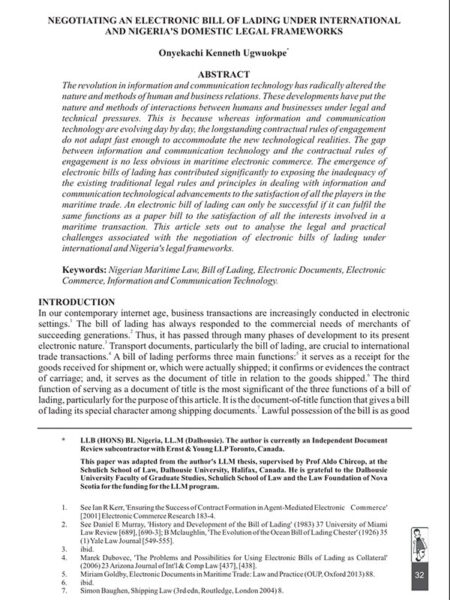
Negotiating an Electronic Bill of Lading under International and Nigeria’s Legal Frameworks
0₦2,500.00Onyekachi Ugwuokpe, Independent Document Review Subcontractor with Ernst & Young LLP Toronto Canada in his article, Negotiating an Electronic Bill of Lading under International and Nigeria’s Domestic Legal Frameworks, notes that although electronic bill of lading in shipping business has great advantages, including savings in time and monetary costs, it has been difficult to replicate the document-of-title function of a bill of lading in an electronic setting. The difficulty for an electronic bill to achieve negotiability arises from the fact that much of the relevant existing legal rules on, and commercial procedures for, negotiating bills of lading are entirely paper-based. The electronic bill of lading is also caught up with the common challenges of electronic documentation, which results from the inability of traditional contract principles to catch up with the rebellious advancements in information and communication technology. Onyekachi masterfully analyses the legal and practical challenges associated with negotiating electronic bills of lading under international and Nigeria’s legal frameworks.
-
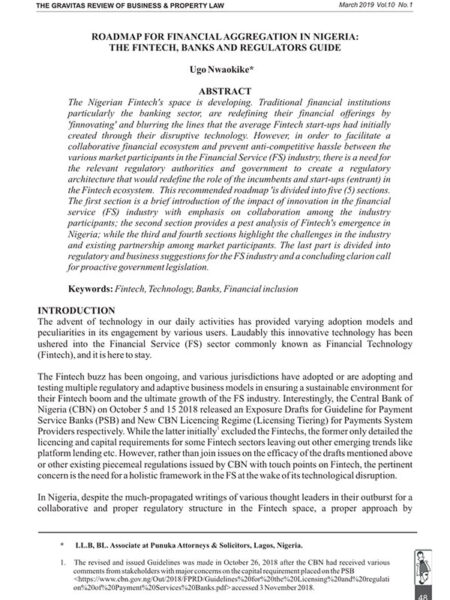
Roadmap for Financial Aggregation in Nigeria: The Fintech, Banks and Regulators Guide
0₦2,500.00Ugo Nwaokike, Associate<, Punuka Attorneys and Solicitors in his article, Roadmap for Financial Aggregation in Nigeria: The Fintech, Banks and Regulators Guide, considers that traditional financial institutions are redefining their offerings to overcome the initial head start fintech start-ups had with their disruptive technology. However, to facilitate a collaborative financial ecosystem and prevent anti-competitive hassle between the various market participants in the financial services industry, there is a need for a regulatory architecture that would redefine the role of the incumbents and entrants in the fintech ecosystem. He examines the challenges in the fintech industry and existing partnership among participants while recommending legislative, regulatory and business measures to achieve a collaborative and cohesive industry.
-
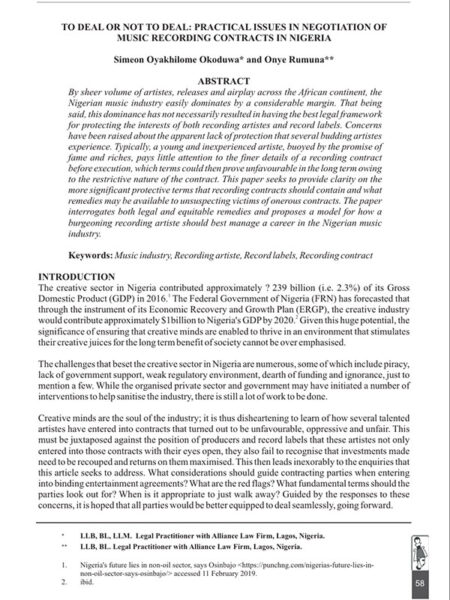
To Deal or not to Deal: Practical Issues in Negotiation of Music Recording Contracts in Nigeria
0₦2,500.00Simeon Okoduwa and Onye Rumuna of Alliance Law Firm, Lagos Nigeria in their article, To Deal or Not to Deal: Practical Issues in Negotiation of Music Recording Contracts in Nigeria, reflect that typically, a young and inexperienced artiste, buoyed by the promise of fame and riches, pays little attention to the finer details of a recording contract before execution, which terms could then prove unfavourable in the long term owing to the restrictive nature of the contract. Okoduwa and Rumuna provide clarity on the significant protective terms that recording contracts should contain and what remedies may be available to unsuspecting victims of onerous contracts. They propose a model for how a burgeoning recording artiste should best manage a career in the Nigerian music industry.
-
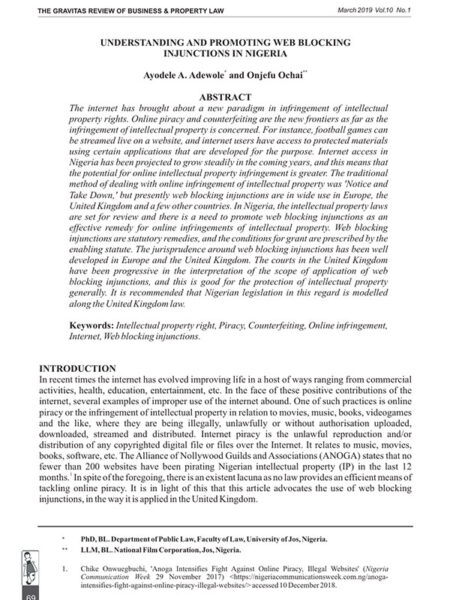
Understanding and Promoting Web Blocking Injunctions in Nigeria
0₦2,500.00Dr Ayodele Adewole of the University of Jos Nigeria,and Onjefu Ochai of the National Film Corporation Jos Nigeria, in their article, Understanding and Promoting Web Blocking Injunctions in Nigeria, observe that the internet has brought about a new paradigm in infringement of intellectual property rights. Online piracy and counterfeiting are the new frontiers as far as the violation of intellectual property is concerned. The traditional method of dealing with online infringement of intellectual property was ‘Notice and Take Down,’ but presently web blocking injunctions are in extensive use in Europe, the United Kingdom and a few other countries where the jurisprudence around web blocking injunctions has been well developed. They observe that the incorporation of measures to deal with online piracy and counterfeiting in Nigeria is long overdue, and web blocking injunctions are the favoured means of achieving this. They recommend reform of Nigerian copyright laws in line with the UK law which has greatly evolved over the course of time.
-
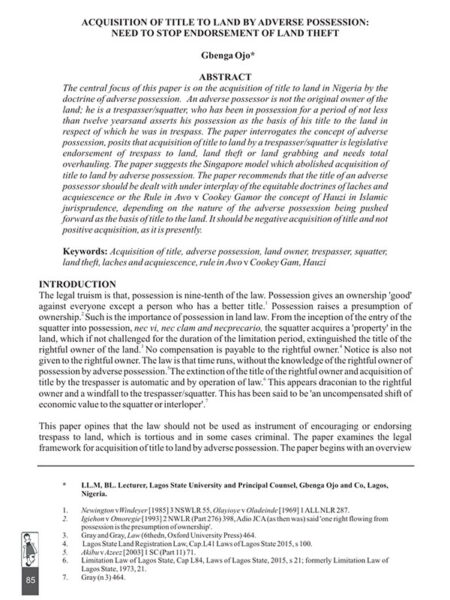
Acquisition of Title to Land by Adverse Possession: Need to Stop Endorsement of Land Theft
0₦2,500.00Gbenga Ojo, Lagos State University and Principal Gbenga Ojo and Co Lagos Nigeria in his article, Acquisition of Title to Land by Adverse Possession: Need to Stop Endorsement of Land Theft, interrogates the concept of adverse possession in land law. He posits that acquisition of title to land by a trespasser/squatter by adverse possession is tantamount to land theft. He argues that the claim of an adverse possessor rather than being dealt with under limitation laws should be taken care of by an interplay of the equitable doctrines of laches and acquiescence or the Rule in Awo v Cookey. He recommends a reform of the law and the adoption of the Singaporean model which abolished acquisition of title to land by adverse possession.
-
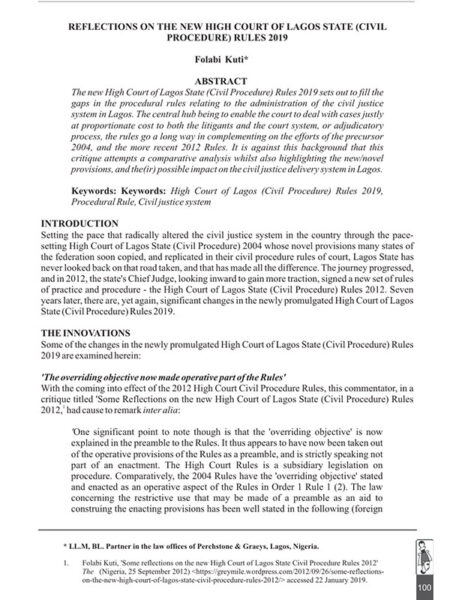
Reflections on the New High Court of Lagos State (Civil Procedure) Rules 2019
0₦2,500.00Folabi Kuti, Partner, Perchstone & Graeys Lagos Nigeria in Reflections on the New High Court of Lagos State (Civil Procedure) Rules 2019, undertakes a comparative analysis of the Civil Procedure Rules of 2012 and 2019, highlighting the novel changes in the new Rules and the likely impact on the civil justice delivery system in Lagos State.
-
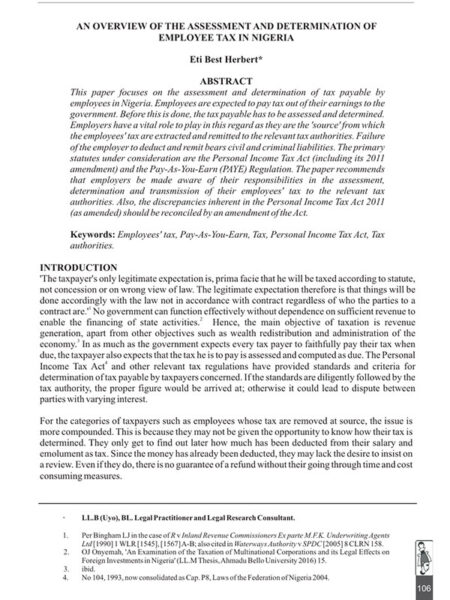
An Overview of the Assessment and Determination of Employee Tax in Nigeria
0₦2,500.00Eti Herbert, Legal Practitioner and Researcher in his article, An Overview of the Assessment and Determination of Employee Tax in Nigeria, examines the provision of the Personal Income Tax Act (PITA)and other relevant laws on the assessment and determination of employee tax in Nigeria; what is chargeable to tax; the implementation of the Pay-As-You-Earn (PAYE) system and, reliefs and deductions. He highlights inconsistencies and inadequacies in the provisions of PITA and other existing laws and recommends a review of the laws.
-
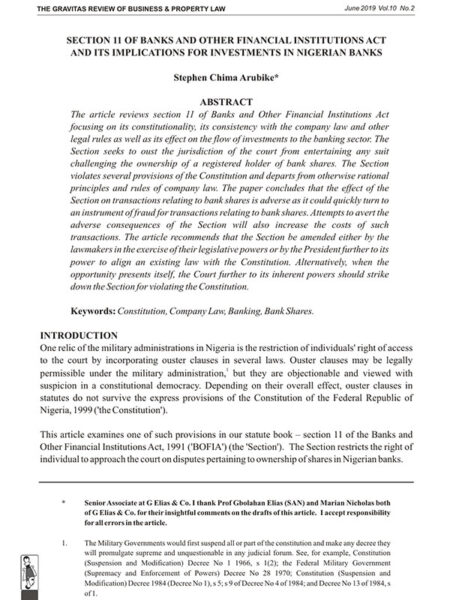
Section 11 of Banks and Other Financial Institutions Act and Its Implications for Investments in Nigerian Banks
0₦2,500.00Stephen Arubike, Senior Associate at G Elias & Co., Lagos Nigeria in his article, Section 11 of Banks and Other Financial Institutions Act and its implications for Investments in Nigerian Banks, examines the implication of section 11 BOFIA which ousts the jurisdiction of the courts in any suit challenging the ownership of a registered holder of bank shares. Stephen considers several decided cases and scholarly on the concludes that the section violates several provisions of the 1999 Constitution of Nigeria and departs from rational principles and rules of company law. He concludes that the section could have negative consequences on dealings and transactions in bank shares and ought to be struck down by the courts or amended by the parliament.
-
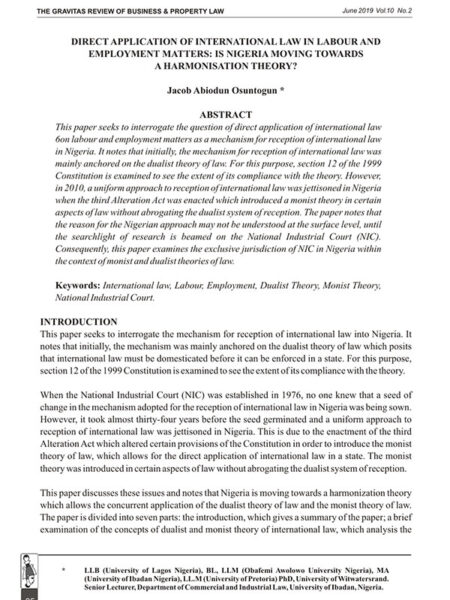
Direct Application of International Law in Labour and Employment Matters: Is Nigeria Moving Towards a Harmonisation Theory?
0₦2,500.00Dr Jacob Osuntogun, Senior Lecturer, Department of Commercial and Industrial Law, University of Ibadan Nigeria in his article, Direct Application of International Law in Labour and Employment Matters: Is Nigeria Moving Towards a Harmonisation Theory? interrogates the issue of direct application of international law in labour and employment matters in Nigeria. Ordinarily, unless international treaties and conventions are domesticated in accordance with section 12 of the 1999 Constitution, they are not applicable in Nigeria. However, section 254C (2) of the Constitution Third Alteration Act 2010 seems to have introduced a monist approach which allows a direct application of international law in labour and employment matters without abrogating the dualist system of reception of international law. Dr Osuntogun examines the dualist and monist controversy and the emergent harmonisation theory within the context of the exclusive jurisdiction of the National Industrial Court.
-
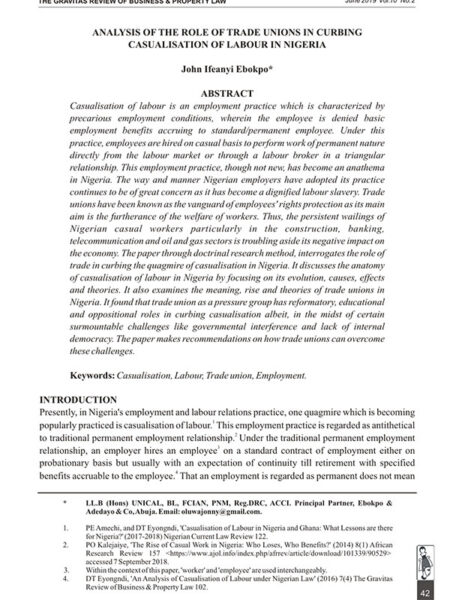
Analysis of the Role of Trade Unions in Curbing Casualisation of Labour in Nigeria
0₦2,500.00John Ebokpo in his article, Analysis of the Role of Trade Unions in Curbing Casualisation of Labour in Nigeria, examines the categories, framework, causes and effects of casualisation of labour. He considers how the reformatory, educational and oppositional roles of trade unions may curb the blight despite the unions’ lack of internal democracy and government interference in their affairs.
The Gravitas Review of Business & Property Law



